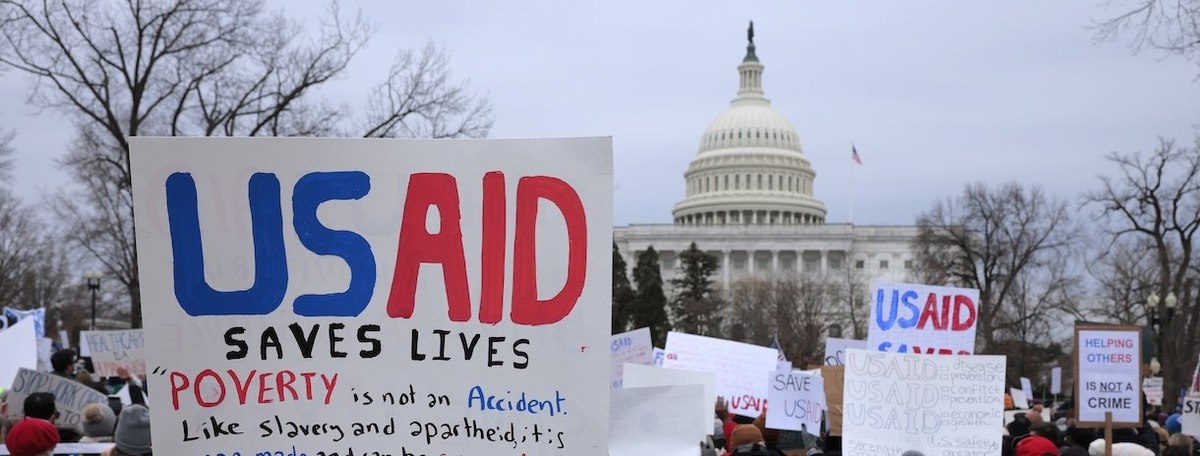The Trump administration recently attempted to shut down the U.S. Agency for International Development (USAID), the federal agency primarily responsible for administering civilian foreign aid and development assistance. This move, which was temporarily blocked by a federal judge, raises the questions of whether and to what extent Americans are in favor of the U.S. providing aid to foreign countries. A new YouGov survey finds that Americans are divided on many aspects of the issue, including questions of what aid should be used for, where it should go, and what its effects are. While support for aid is generally higher than opposition to it, many believe the U.S. spends too much on aid, and that it spends a larger share of its economic output on aid than other industrialized countries do.
Should the U.S. provide foreign aid?
Americans are somewhat more likely to strongly or somewhat support U.S. foreign aid than they are to oppose it (47% vs. 40%). Three-quarters (75%) of Democrats support the U.S. providing foreign aid, while 62% of Republicans say they are opposed. Independents are evenly divided: 40% are in favor of foreign aid and 40% are opposed.
Americans are more likely to say the U.S. spends too much on foreign aid (46%) than too little (11%); 24% say it spends the right amount. Slightly fewer now say U.S. aid is too high than did in 2016 (46% vs. 51%), which was the last time YouGov posed this question. Democrats are especially likely to have changed their views; half as many now say the U.S. spends too much on foreign aid as did in 2016 (20% vs. 42%).
Foreign aid accounts for less than 2% of the U.S. federal budget, far less than other expenses, including national defense, Social Security, and Medicare. Yet just 26% of Americans correctly say that foreign aid receives less funding than each of these other programs.
And while the U.S. spends more on foreign aid than any other country, its contributions as a proportion of its Gross National Income (GNI) are below the levels of many other wealthy countries.
Most Americans aren't aware of this, though. 40% think that relative to the size of its economy, the U.S. spends more on foreign aid than other industrialized countries and 16% think it gives about the same amount. 13% think it gives less and 31% aren't sure.
When the same question was asked in 2016, an even larger share (52%) of Americans thought the U.S. provided more foreign aid than other countries, relative to the size of their economies.
Which countries should the U.S. aid?
Who should receive U.S. aid? Americans are slightly more likely to say that aid should be focused on countries that support U.S. foreign policy interests (38%) than to say it should be focused on the poorest countries (33%). Most Republicans (59%) think countries that prioritize U.S. foreign policy interests should be prioritized when it comes to aid, while most Democrats think it should focus on the poorest countries (53%). Views on this topic have changed little since 2016, when the question was last asked.
Which specific countries should the U.S. offer aid to? Our survey asked about 10 potential aid recipients; of those, Americans are most likely to strongly or somewhat support aid to Ukraine (51%), Taiwan (48%), and Israel (46%). Far fewer support giving aid to Iraq (18%), Afghanistan (18%), Yemen (21%), or Syria (21%). (The question did not specify or distinguish between military and non-military aid.) Democrats are more likely than Republicans to support aid to nine of the 10 countries; the exception is Israel.
Which types of aid should the U.S. provide?
Our survey asked about 13 types of aid, and found that more than half of Americans favor U.S. aid being used for each of the following: disaster response, food security, counter-terrorism, anti-drug-trafficking, poverty relief, health care, and education and workforce development. Smaller shares favor the U.S. providing aid for military assistance or democracy promotion.
What are the effects of foreign aid?
There is little public consensus on how foreign aid affects the U.S. or the countries it seeks to help. Roughly half (48%) of Americans believe that providing foreign aid increases U.S. global influence. Fewer say that foreign aid increases U.S. national security (33%) or economic security (30%). Americans are divided on how foreign aid affects immigration to the U.S.: 27% think it increases immigration, 18% think it decreases it, and 33% think it has no effect. More Americans think that U.S. foreign aid decreases (27%) than increases (15%) the likelihood of humanitarian crises abroad.
— Carl Bialik contributed to this article
See the results for this YouGov poll
Methodology: This article includes results from an online survey conducted February 4 - 6, 2025 among 1,142 U.S. adult citizens. Respondents were selected from YouGov’s opt-in panel to be representative of adult U.S. citizens. The sample was weighted according to gender, age, race, education, 2024 presidential vote, 2020 election turnout and presidential vote, baseline party identification, and current voter registration status. 2024 presidential vote, at time of weighting, was estimated to be 48% Harris and 50% Trump. Demographic weighting targets come from the 2019 American Community Survey. Baseline party identification is the respondent’s most recent answer given around November 8, 2024, and is weighted to the estimated distribution at that time (31% Democratic, 32% Republican). The margin of error for the overall sample is approximately 4%.
Image: Getty













